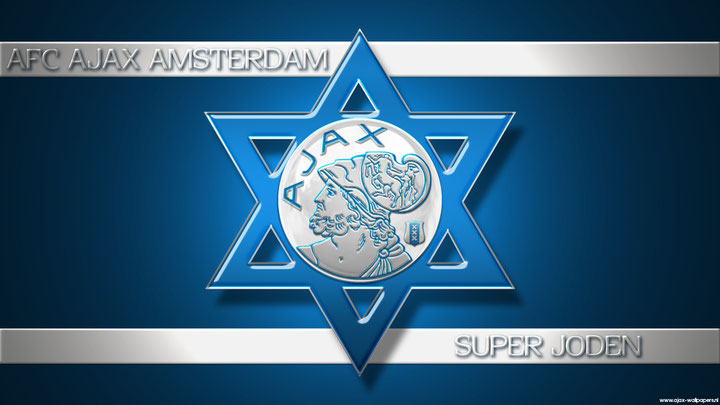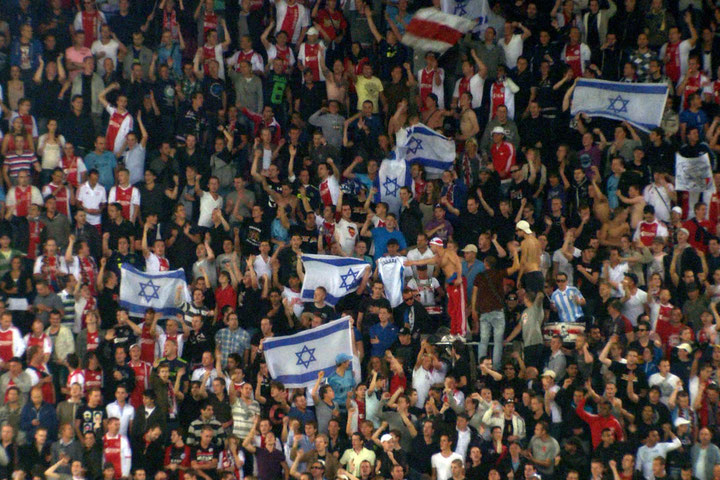Issue 2/2014 - Net section
Superjews: Thoughts on Ajax and the Jews following Nirit Peled’s Documentary Film
Superjews (2013) is a documentary film which investigates the strange phenomenon of Ajax soccer team fans appropriating the nickname Superjews – complete with star of David tattoos, Israeli flags and Hebrew marching songs. Director Nirit Peled, an Israeli woman who works and lives in Amsterdam, tracks the history of Ajax’s Superjews and the complex relation between the city of Amsterdam and its Jews, while at the same time contemplating her own identity as an Israeli/Jew in the diaspora. Superjews is a film about Jewish identity in particular, but also about identity in general and how it relates to symbols which form a community. More than giving answers to what Jewish identity consists of, the film suggests it as a question that remains open and shows the ambivalences and paradoxes of contemporary Jewish existence, which in fact are relevant to Jews and non-Jews alike.
According to Peled, what motivated her to make the film was an incident that happened when she was 20 years old. Peled just arrived to Amsterdam. Before she left Israel her father told her to hide her star of David necklace in order not to be detected as a Jew. A week later she sat in a tram in Amsterdam that was full with Ajax supporters. They carried Israeli flags, David stars on their hats and T-shirts, and were chanting Israeli songs in Hebrew. Peled got scared and stepped out of the tram. While she was taught to keep her Jewish identity hidden, those Ajax fans were shouting it out loud, announcing themselves as "super Joden” (Superjews).
Most Jews from Amsterdam that are interviewed in the film, including some Ajax fans, dislike the super-Jews and see this phenomenon as offensive. The Jews that live in the city today, just like Peled’s father advised her to do, tend to hide their Jewish identity signs in order not to get into trouble. Paradoxically, the non-Jewish supporters of Ajax wear them with pride.
Peled says that when she came to Amsterdam, she didn't feel like a “Super Jew”, but more like a refugee. Ironically, she who was fed up by Israeli politics and tried to escape Israel’s blatant patriotism and flag worshiping, found a bizarre appropriation of it in her place of refuge.
The film ponders about Jewish identity – who, or what, is a Jew? Peled is Jewish, but she, like many others of her generation, doesn’t know what it means. And while she is Jewish but doesn’t feel like it, the Ajax fans she interviews feel Jewish, but they’re actually not. In fact, there is no definite answer to what constitutes a Jewish identity – ethnic origin, a religion, a nationality, or a culture – these parameters can constitute a Jewish identity together or separately, but none of them is necessary. Even though Peled does not believe in a God, she is a Jew simply because her mother is Jewish, but anyone who converts to Judaism will become no less of a Jew than she is. And so, what about the Ajax fans who see themselves as Jews? Can they, who were “converted” in the soccer field, be truly called Jewish?
It seems that for them Jewish identity is a much simpler thing than for a born and raised Jew like Peled. As a secular Jew, she finds it difficult to describe her Jewishness. In Israel the question of Jewish identity is answered with nationalism: being Jewish means being an Israeli citizen and serving in the Israeli army. In Israel, the Jewish and Israeli identities correlate. Israel is a state that is officially defined as Jewish, a state which does not separate religion from state affairs. The state uses old Jewish religious symbols such as the David star to further ground this link and create the myth of “return”, as if the same people returned to the same land, thus suppressing more than two thousand years of Jewish existence in the diaspora.
Interestingly, the use of the David star by Ajax fans as their symbol reflects back on the Israeli use of it. After all, both are artificial, manipulating a symbol to their own use while emptying it of its original religious meaning.
Amsterdam is considered a Jewish city. It is traditionally called “mokum” by Amsterdammers, a word which in Hebrew means “place”, but has a religious connotation as a place where God resides. However, this is not the reason for the super-Jews phenomenon, or the few Jews who were active as players and managers of the Ajax football team. As the film shows, the real motive was to counterattack the use of the nickname “Jews” as a negative trope against Ajax fans. At a certain moment, the fans adopted this name and started to use Jewish symbols as positive tropes directed against their enemies.
According to Jean-Paul Sartre the Jew is defined as ‘one whom other man consider a Jew.’ Antisemitism sets the existential conditions for the Jew and therefore ‘it is the anti-Semite who creates the Jew.’ Similarly, Ajax fans were called ‘Jews’ by those who hated them, and eventually they became “Jews”. Their condition reminds of Mr. Klein in Joseph Losey’s film from 1976 which tells the story of a non-Jewish man during the Nazi occupation of France, who becomes “Jewish” because his anti-Semitic surroundings misrecognize him as such. But is it enough to be pointed as Jew in order to become one? And why should Jewishness be defined by those who abhor it?
When Ajax fans call themselves ’Jews‘ they transform real Jews into metaphorical figures. This can be seen as a continuation of the Christian tradition to declare itself as the real church of Israel, thus excluding real Jews from their own identity. While the use of the Jewish trope by Ajax fans is positive, according to Daniel and Jonathan Boyarin, even when well intended, any ‘allegorization of the Jew is problematic in the extreme for the way that it deprives those who have historically grounded identities in those material signifiers of the power to speak for themselves and remain different.’
However, the material signifiers of real Jews are also symbolic. These symbols form what Benedict Anderson termed as an ‘imaginary community’, that is, a community imagined by the people who perceive themselves as part of that community, just like the “Jewish community” of the Ajax fans. As Shaye J. D. Cohen claims (referring to the concept of Jewishness in antiquity), ‘Jewishness, like most – perhaps all – other identities, is imagined; it has no empirical, objective, verifiable reality to which we can point and over which we can exclaim, “this is it!” Jewishness is in the mind.’
Ajax fans insist that their use of Jewish symbols has nothing to do with real Jews, but can the word “Jew” be separated from the people who are historically connected to it? When fans from rival soccer clubs chant ‘Hamas! Hamas! Jews to the gas’, real Jews feel implicated in the most horrible way. The use of Jewish symbols by Ajax fans has nothing to do with real Jews on the one hand, and everything to do with them on the other. While many Jews lived in Amsterdam and supported Ajax before the war, during the war around 80 percent of Amsterdam’s Jews were sent to the Nazi death camps, and the ones who stayed were obviously not allowed to enter the Ajax arena.
For many Jews of the older generation, such as Peled’s father, the Israeli flag represents security and a safe haven from persecutions. For Peled the same flag represents a bitter conflict and a reminder of unjust occupation. But for an Amsterdammer this flag means Ajax. The symbols are empty, but different individuals inject them with meaning and then unite around them. The same process occurs with a soccer club and the formation of a state – both construct an imaginary identity around empty signifiers.
One of the scenes in the film shows Peled amongst a massive crowd of Ajax fans during a game. When the crowd gets excited, they start to chant ’who doesn’t jump is not a Jew‘. While everybody jumps around her, only Peled doesn’t. Who is, then, the real Jew? It seems that if there is a definition to Jewish identity in the film it is the becoming other from yourself. As Jacques Derrida said it: ‘the more you break up self-identity, the more you are saying ‘My self-identity consists in not being identical to myself, in being foreign, the non-self-coincident one,’ etc., the more you are Jewish!’

